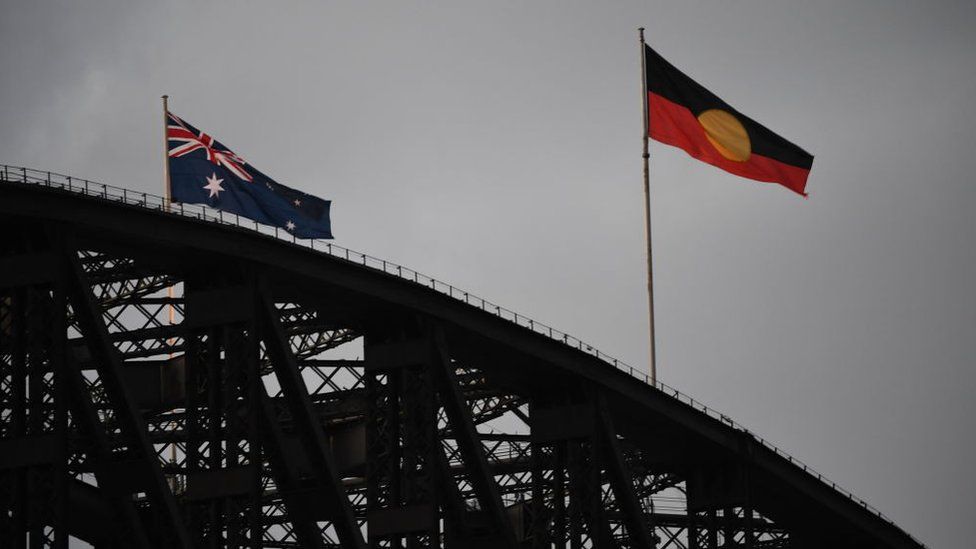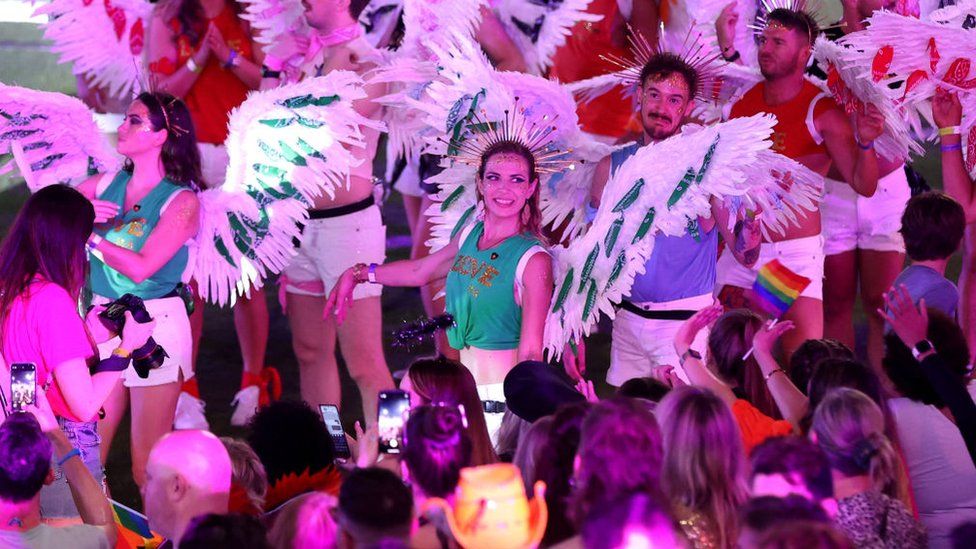Miriam Margolyes: ‘I now look up to Australian bogans’
Miriam Margolyes #MiriamMargolyes

Image caption,
Miriam Margolyes spent time with ‘bogans’ for her latest documentary
In a new documentary, actress turned presenter Miriam Margolyes investigates whether Australia’s fabled classless society is mythical, or if it can stand by its claim to be the land of the ‘fair go’. She speaks to Gary Nunn from London.
Margolyes, true to candid form, insists she’d never before met a ‘bogan’ in her life – and neither did she want to.
“I was guilty of snobbery, of looking down on them,” she confesses in her documentary, Australia Unmasked.
After spending time with an autistic, self-confessed ‘bogan’ – colloquial Australian for an uncouth person of low social status – Margolyes discovered a new-found empathy.
“When I do these documentaries, I just open myself to the people I meet. And I receive what they want to give me,” she tells the BBC. “I was surprised how much I thoroughly enjoyed my time with the bogans.”
They exhibit, Margolyes says, the distinctly Australian trait of larrikinism. “In how much they enjoy themselves. They made me laugh, and I grew quite affectionate about the bogans after doing burnouts in cars with them!”
‘Bogan’ is a controversial slang word. Its British counterpart – ‘chav’ – has long drawn accusations of revealing a sneering class hatred.
Margolyes, who is British-Australian, is against discouraging usage of words, but implores politeness.
“It’s not a very pleasant way of describing people. There’s no point discouraging it because people are going to use it. But I no longer feel I’m above bogans. They’re a community; they’re generous and they’re fun. I look up to them.”
So the Australian ideal of the ‘fair go’ isn’t so much which class you come from but if you’ve got the right support behind you, she says.
‘Progress is happening’
A veteran of stage and screen, Margolyes is perhaps most well known for playing Professor Sprout in Harry Potter and for being a comic raconteur on The Graham Norton Show. Her later career has seen her tackle taboo subjects, such as death and obesity, as a documentary presenter.
In her new ABC programme, she sets out to explore whether the pandemic has diminished Australia’s feted egalitarianism or deepened divisions.
Along the way she asks Melbourne students at one of Australia’s most expensive schools if they think they’re privileged snobs. She’s moved to tears as an illiterate Tasmanian man struggles to read a paragraph for the first time, citing that almost 50% of Tasmanian adults are functionally illiterate.
When interviewed in 2019, Margolyes feared “the sun has gone down on Australia’s fair go”, attributing this to racism and poor distribution of wealth.
But now “progress is happening”, she argues, citing the Australian government’s commitment to setting up an Indigenous advisory body to parliament, and Aboriginal woman Cheree Toka’s successful campaign to fly the Aboriginal flag permanently atop the Sydney Harbour Bridge.

Image source, Getty Images Image caption,
The Aboriginal flag is now permanently displayed on the Sydney Harbour Bridge
She names First Nations Australians as those most excluded from the ‘fair go’ politicians like to talk about. “Recent changes somewhat ameliorate the situation but there’s far to go,” she says.
Many people Margolyes meets on her travels – from polo players to a homeless man – respond that they’re middle class when she asks. It suggests the fair go, for many, is a state of mind.
“Education, not money, makes you middle class in Australia,” Margolyes posits.
Meeting independent politician Jacqui Lambie – who says she wore charity shop clothing for her first three months as a senator – gives an insight into class divisions within education, as the pair eat roadkill wallaby.
“Did you read much Charles Dickens?” Margolyes, a Dickens fanatic, asks of her schooldays, which ended in year 10. “No, but heaps of Jackie Collins!” Lambie retorts.
‘Attending my first – and last – gay pride event’
A group Margolyes is surprised to have been so recently excluded from the fair go is Tasmania’s LGTBQ+ community. The state decriminalised homosexuality only in 1997.
Veteran reform campaigner Rodney Croome tearfully recounts relatively recent stories of homophobia and suicide.
“I didn’t know there were places in Australia that hated gays so much they’d have violent altercations. Unthinkable,” Margolyes says. “But the brilliant Rodney won them round.”
Croome says of their emotional encounter: “People ask if Miriam is as blunt as she is on TV; the answer is a definite yes. But Australians tend to associate bluntness with insensitivity; that couldn’t be further from the truth with Miriam. She’s genuinely warm, caring and curious.”

Image source, Getty Images Image caption,
Sydney will host World Pride in 2023
In episode one, Margolyes attends her first ever gay pride march – in Hobart, Tasmania.
“It was affirming for us to have someone of Miriam’s standing take an interest in Tasmania’s transformation,” Croome tells the BBC.
“Miriam’s path to acceptance has been a difficult one. Ours has been too. When Miriam joined us in the parade, our journeys were united by a deep respect for how hard our struggles have been and a desire to support each other in declaring our pride.”
While an experience she enjoyed, Margolyes – who has said her unaccepting mother had a stroke from which she never recovered three days after discovering Miriam was a lesbian – doesn’t plan on repeating it.
“I’d fight to the death for people to love who they want to love,” she says. “I just can’t get overexcited about the fact I’m gay. It’s just a part of life. It isn’t the most important adjective for me to describe myself.”
She longs for the day gay people feel so relaxed they don’t need to talk about it so much. “I’m grateful I’m gay. It’s a crusade from my point of view for the gayness to be forgotten, because it’s no longer important.”
That said, she’s thrilled Sydney will host World Pride next year. “Sydney is the gay centre of the world. It relishes it. I think that’s fun.”
A decade of citizenship
Even before becoming a citizen a decade ago via her partner, Heather, Margolyes had a longstanding love affair with Australia – specifically, a small country town in New South Wales, Robertson, where she purchased land 22 years ago.
She escapes there with Heather, who she sees approximately eight times a year; the pair live in different countries.
“I love Robertson because I love small, unpretentious towns,” she says.
“Unfortunately, it’s gentrifying. Too many people from inner city Sydney are arriving – ‘weekenders’ – which is a shame, because it’s beautiful: the trees, the escarpment and the waterfalls are lovely.”
At 81, Margolyes is busier than ever with numerous projects, and she is interested in continuing her Australian series. Next time she wants to focus on Western Australia.
“We didn’t get there because of their Covid restrictions, so I’d love to investigate the west – it’s wild, unexplored and has a strong wine industry I’d like to learn more about,” she says.
Her last word on Australia’s fair go? “The fair go isn’t sailing on the water; it’s a choppy sea.”
Australia Unmasked is now airing in Australia on ABC iView. In the UK, it will air on the BBC at a later date.
![]()
You may also be interested in:
Media caption,
Actress Miriam Margolyes talks to Matthew Stadlen about the importance of provoking people, what makes a good actor, her love of Charles Dickens and why she has always been a show-off